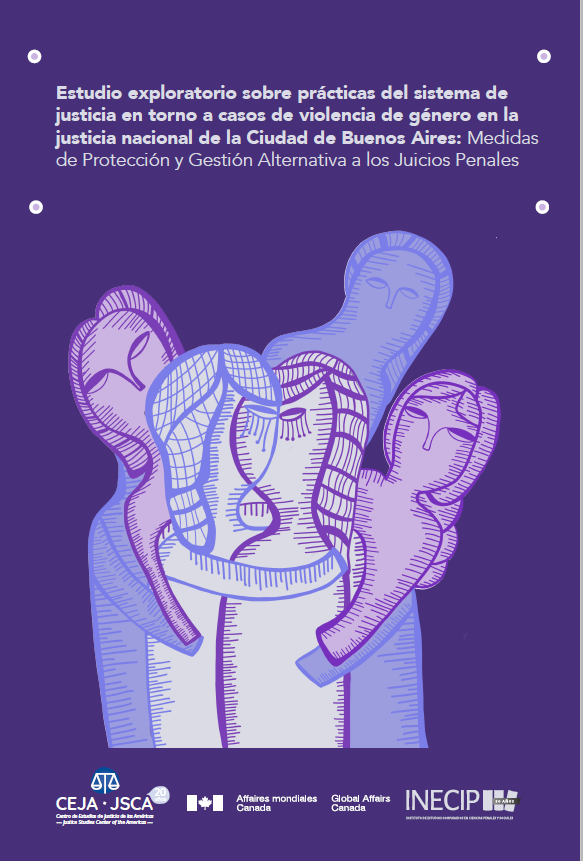
The Justice Studies Center of the Americas (JSCA) and the Working Group on Feminisms and Criminal Justice of the Institute for Comparative Studies in the Criminal and Social Sciences (INECIP) present the qualitative research study,
“Exploratory study on justice system practices around cases of gender violence in the Buenos Aires justice system: Protective measures and alternative management of criminal trials.”
The goal of the study was to produce information on the work of the justice system in cases of violence against women in the context of intimate relationships. The study was meant to provide a preliminary answer to a crucial question for victims: How are victims of violence protected and provided reparations in cases that do not go to trial?
The research was conducted with the Gender Policy Directorate of the National Public Prosecutor’s Office, which identified criminal cases, in collaboration with the Legal Support for Victims of Gender Violence Program of the National Public Defender’s Office and the Feminist Attorneys’ Network, which identified civil cases.
It was developed in the context of the Comprehensive Law to Prevent, Punish and Eradicate Violence against Women (Law 26.845), which was passed in 2009 in fulfillment of the international mandates set out in the Belém do Pará Convention. This law expanded the set of protective measures -which can be issued in both civil and criminal cases but tend to be used mainly in civil justice- and prohibited alternative measures such as mediation and conciliation for criminal cases. As such, it left open the question as to whether conditional suspension can be used, generating positions in favor of and against the use of this mechanism.
In that context, the study, which was led by Ileana Arduino and coordinated by Soledad Pujó, was designed to provide a qualitative analysis of protective measures, conditional suspension of the proceedings and the effectiveness and timeliness of judicial intervention in 32 cases of gender violence.
In regard to protective measures, the study revealed that 64% of victims had previously filed a complaint regarding violent acts. As the study states, this “demonstrates that there are lacks in the Judiciary and State institutions … in regard to taking measures to stop violence, ensure that it does not continue and require that adequate support services be provided to victims.”
Disappointingly, this information is complemented with the finding that 57% of the protective measures decreed were violated. In some cases, the issue is that the measures only cover the woman and fail to address the issue of the children involved, and the victims have the duty to facilitate contact between the minors and their father, the aggressor. One respondent explained:
“They issued a restraining order for two or three years, but he was allowed to contact me about his relationship with his daughter. For example, if he called the house and I answered, we were supposed to have a conversation about our daughter. This is odd because he has no limits. Things went well the first and second times, but then he made some comments during the third call, pushed it a bit further during the fourth call, and it just continued until I had to cut off contact.”
The conditional suspension of the trial is the measure that generates different positions. This is due in part to the role that the victim plays in it. As such, the researchers sought to analyze victim participation in the use of this tool, focusing on aspects such as their expectations regarding the process, the type of intervention used while the measure was in place and the scope of the reparations.
The research shows that women’s main need is for their aggressors to be prevented from contacting them and to receive a guarantee that the incident will not be repeated. Furthermore, it reveals that 67% of complainants were consulted regarding the application of the conditional suspension of proceedings. Furthermore, in 61% of cases in which the victim’s interest in conditional suspension was identified (which occurred in 89% of cases), the judicial official considered that interest in their decision. It was also found that the reparations offered do not seem to be sufficient.
It is interesting to note that 44% of the measures issued in this context were completed fully, 11% partially and that they were not completed by the defendant in 45% of cases. Of those completed, only 28% did not require warnings or extensions.
It is concerning that the study does not identify action on the part of judicial operators or the prosecutor’s office in regard to oversight of measures issued in the context of conditional suspension of the proceedings. Furthermore, the study indicates that the amount of time that passes between the complaint, the hearing and the completion of the process call into question the usefulness of this tool for resolving the conflict.
The effectiveness and timeliness of the judicial intervention also presented deficiencies. The steps following the complaint present the greatest amount of revictimization of women. These deficiencies include the fragmentation of responses provided by the system and the multiple case files generated, which force women to repeat their statements. In addition to this revictimizing experience, they must undergo repeated assessments. In the words of one respondent:
“I had to file a ton of complaints. It isn’t easy to go to the Crime Victim’s Office, to my lawyer, to the judge, to the prosecutor’s office. I work… at one point I had to beg so that they wouldn’t dock my pay. I did a million things. I went to all of those places while he walked free (…)”.
The study includes a socio-demographic profile of the people involved and an explanation of the methodology used.
Click here to download the pdf.
